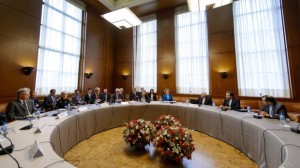 (Reuters) - The United States would welcome a further bilateral meeting with�Iran�on the sidelines of nuclear negotiations between Tehran and six major powers that began in Geneva on Tuesday, a U.S. State Department spokeswoman said.
(Reuters) - The United States would welcome a further bilateral meeting with�Iran�on the sidelines of nuclear negotiations between Tehran and six major powers that began in Geneva on Tuesday, a U.S. State Department spokeswoman said."We would welcome an opportunity for a bilateral and have said so," Deputy State Department spokeswoman Marie Harf said during a break in talks between Iran and the United States, Russia,�China, Britain, France and Germany.
Earlier on Tuesday, Iranian Deputy Foreign Minister Abbas Araqchi said that neither the Iranian nor U.S. delegations had asked for such a meeting. He was speaking to reporters after Foreign Minister Mohammad Javad Zarif presented the six powers with an Iranian proposal aimed at ending the decade-long standoff over Tehran's nuclear ambitions.
U.S. Secretary of State John Kerry held bilateral talks with Zarif in New York last month after Iran's top diplomat met foreign ministers of the six powers on the sidelines of the U.N. General Assembly's annual gathering of world leaders.
A day after Zarif and Kerry had their brief face-to-face meeting, U.S. President Barack Obama and new Iranian President Hassan Rouhani spoke by telephone, the highest-level contact between the two countries in three decades and a sign that they are serious about reaching a pact on Tehran's nuclear program.
The bilateral contacts are the culmination of a recent dramatic shift in tone between Tehran and Washington, which cut off diplomatic relations with Iran a year after the 1979 revolution that toppled U.S. ally Shah Mohammad Reza Pahlavi and led to the U.S. Embassy hostage crisis in Tehran.
Obama has said for years he was open to direct contact with Iran while also stressing that all options - including military strikes - were on the table to prevent Iran building a nuclear bomb. Tehran denies allegations by Western powers and their allies that it is seeking the capacity to make atomic weapons.
By Reuters
The Iran Project is not responsible for the content of quoted articles.










